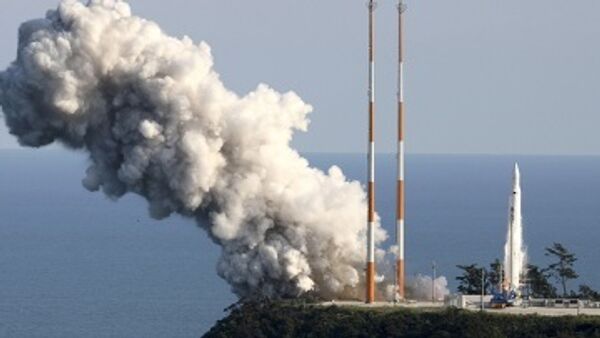MOSCOW, August 26 (RIA Novosti) - A problem with a payload fairing system prevented the first South Korean indigenous satellite from entering its designated orbit after Tuesday's launch, Yonhap news agency quoted officials as saying.
The two-stage Korea Space Launch Vehicle-1 (KSLV-1) rocket failed to deliver the 100-kilogram oceanic and atmospheric research satellite into its target orbit. The rocket was launched from the Naro Space Center, 485 kilometers (300 miles) south of the capital Seoul.
South Korea's Ministry of Education, Science and Technology said that the first and second stage rockets separated as planned, but one of the two fairings covering the satellite failed to fall off.
"The fairings weigh 300 kg [660 pounds] or three times more than the scientific satellite, making it effectively impossible for the second stage rocket to generate the necessary thrust to keep the satellite in orbit," Yonhap quoted deputy minister Kim Jung-hyun as saying.
South Korean officials say the satellite has been lost.
KSLV-1, built in cooperation with Russia, is based on the Angara carrier rocket. The carrier rocket is designed to deliver small satellites into low orbit and can carry a payload of up to 100 kg (220 lbs).
Russia's Khrunichev space center, which developed the first stage of the KSLV-1 launch vehicle, said on Tuesday that the first and the second stages separated successfully.
South Korea began developing its own space program in 1996. Seoul has already launched 11 satellites since 1992, using foreign carrier rockets and launch sites.
South Korean President Lee Myung-bak has called the launch a "half success," and reaffirmed the country's drive to become a member of the so-called 'space club,' whose members have developed their own rockets and satellites and sent them into space from a launch facility on their own soil.
Seoul plans to build a more powerful rocket named KSLV-2 and launch it by 2018 without foreign assistance.
The vehicle is expected to be a 50-meter (164-foot) three-stage rocket, capable of carrying a payload of up to one metric ton.




